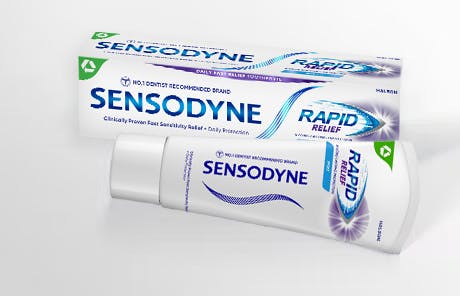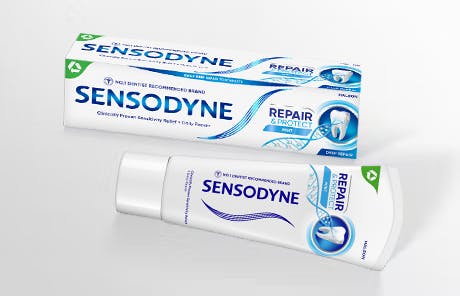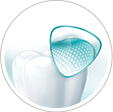Fluoride in Toothpaste: Uses, Benefits, Side Effects
What is Fluoride?
Fluoride is a natural mineral found in water; the amount varies depending on where you live in the UK. It’s added to the water supply through a process called fluoridation and is also added to many brands of toothpaste, such as Sensodyne, because it can help prevent tooth decay.1
Fluoride helps to prevent tooth decay by making the tooth more resistant to acid attacks, as well as reversing early signs of decay.2 It’s an important part of tooth development in children for healthy, strong teeth. It helps strengthen tooth enamel, which is the hard, translucent substance that protects your teeth, whilst helping to prevent cavities.3 Fluoride also helps speed up remineralisation, returning minerals into the enamel layer, as well as disrupting acid production in teeth in both adults and children.2
What are the benefits of Fluoride?
Brushing your teeth daily with fluoride toothpaste is one of the most effective ways to prevent tooth decay. There are a wide variety of toothpastes with fluoride containing different levels of fluoride. The quantity, measured in parts per million (PPM), can be found on the side of the tube. Toothpastes containing 1,350 to 1,500ppm are the most effective; however, your dentist might recommend a higher-strength toothpaste with fluoride if you are at risk of tooth decay.1
The recommended dosage of fluoride is as follows:1
- Children under 3 years old. Children under 3 should brush twice daily with a smear of toothpaste containing at least 1,000ppm of fluoride.
- Children aged 3-6 years old. Children aged 3-6 should brush twice daily with a pea-sized amount of toothpaste containing 1,000ppm of fluoride.
- Adults. Adults should brush twice daily with toothpaste containing 1,350-1,500ppm of fluoride.
Some adults are more prone to tooth decay than others, due to various health conditions, and would benefit from additional fluoride, these include:2
- Dry Mouth. This can be caused by diseases such as Sjogren’s syndrome, certain medications and head and neck radiation treatment.
- Gum Disease. This exposes more of your tooth and roots to bacteria and increases the chance of tooth decay.
- History of Cavities. If you are prone to getting at least one cavity per year, you will benefit from additional fluoride for teeth.
- Crowns/Bridges/Braces. This can put teeth at risk of decay at the point where the crown meets the underlying tooth structure or around the brackets of orthodontic appliances.










